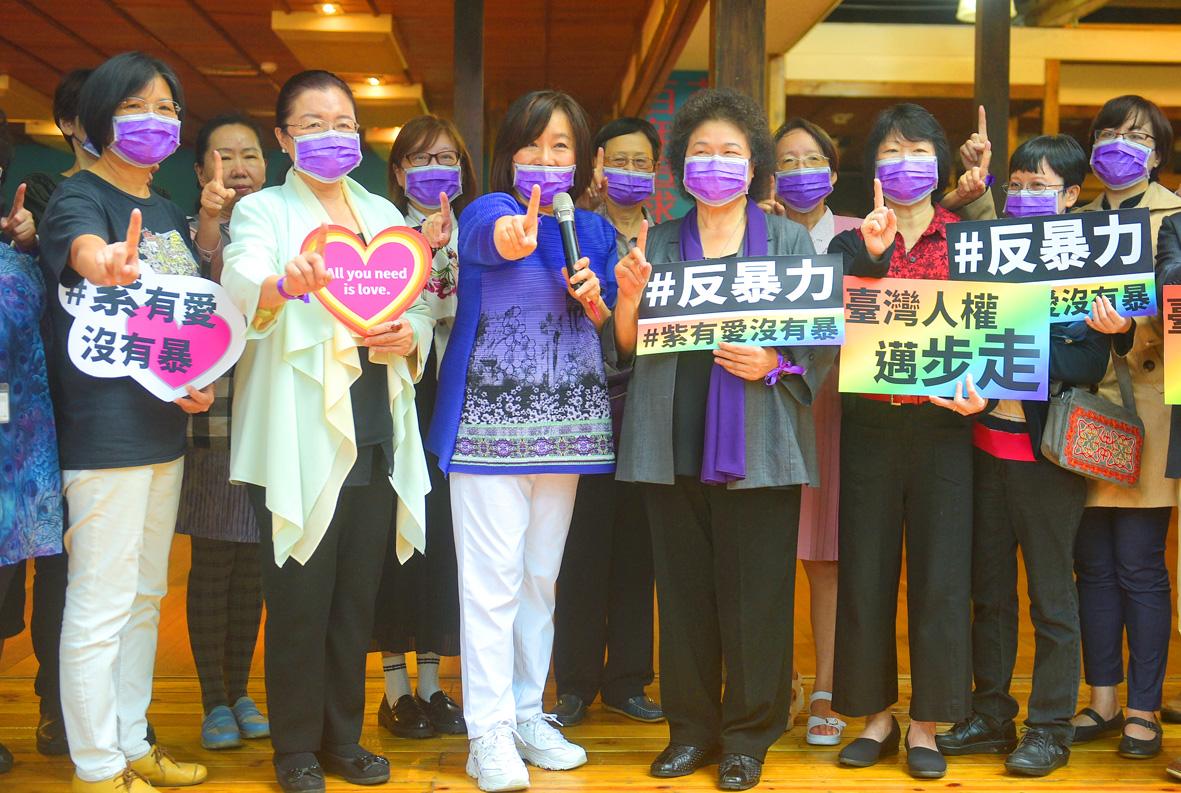The National Human Rights Commission yesterday honored the “mother of Taiwanese modern dance,” Tsai Jui-yueh (蔡瑞月), who was imprisoned by the Chinese Nationalist Party (KMT) regime during the White Terror era.
The commemoration, held at the Tsai Jui-yueh Dance Research Institute in Taipei, comes ahead of the UN’s International Day for the Elimination of Violence Against Women on Wednesday next week.
At the event, Control Yuan President Chen Chu (陳菊), the commission’s chairwoman, talked about Tsai and her husband, Lei Shih-yu (雷石榆), in recalling Taiwan’s democratic transition, during which many people were persecuted and killed.

Photo: Chang Chia-ming, Taipei Times
“We want people to remember the history of the struggle for freedom, so that we can have the will to defend and love our freedom and democracy, which came about only through hard-fought efforts,” Chen said.
A documentary on Tsai’s life was shown at the commemoration, with many in attendance wearing purple ribbons to raise awareness about violence against women.
Tsai’s story has come to represent the victims of the White Terror era, when in 1949 the KMT arrested Lei, an Indonesian-born poet, on suspicion of being a communist agent and deported him to China, separating him from Tsai and their son for more than 40 years, Chen said.
Tsai was also arrested, presumably for maintaining contact with Lei, and incarcerated in Taipei and later for three years on Green Island, Chen said.
Tsai was released in 1953 and founded a dance studio in Taipei, but she and her school were under constant surveillance by the authorities, who disrupted her work and performances, and prevented her from leaving Taiwan.
“Tsai and Lei’s love story lasted through tragic circumstances for many decades, and it has moved many people. It happened because of state violence against a woman,” Chen said.
“We must pursue human rights at all times. It is not possible to reach into every corner to hear every cry for help and sad story. It is up to everyone to be vigilant and strive to listen for the voices of society’s underprivileged, and find ways to help them,” she added.

The Grand Hotel Taipei on Saturday confirmed that its information system had been illegally accessed and expressed its deepest apologies for the concern it has caused its customers, adding that the issue is being investigated by the Ministry of Justice Investigation Bureau. The hotel said that on Tuesday last week, it had discovered an external illegal intrusion into its information system. An initial digital forensic investigation confirmed that parts of the system had been accessed, it said, adding that the possibility that some customer data were stolen and leaked could not be ruled out. The actual scope and content of the affected data

‘LIKE-MINDED PARTNER’: Tako van Popta said it would be inappropriate to delay signing the deal with Taiwan because of China, adding he would promote the issue Canadian senators have stressed Taiwan’s importance for international trade and expressed enthusiasm for ensuring the Taiwan-Canada trade cooperation framework agreement is implemented this year. Representative to Canada Harry Tseng (曾厚仁) in an interview with the Central News Agency (CNA) said he was increasingly uneasy about Ottawa’s delays in signing the agreement, especially as Ottawa has warmed toward Beijing. There are “no negotiations left. Not only [is it] initialed, we have three versions of the text ready: English, French and Mandarin,” Tseng said. “That tells you how close we are to the final signature.” Tseng said that he hoped Canadian Prime Minister Mark Carney

President William Lai (賴清德) yesterday bestowed one of Taiwan’s highest honors on Saint Vincent and the Grenadines (SVG) Ambassador Andrea Clare Bowman in recognition of her contributions to bilateral ties. “By conferring the Order of Brilliant Star with Grand Cordon on Ambassador Bowman today, I want to sincerely thank her, on behalf of the Taiwanese people, for her outstanding contribution to deepening diplomatic ties between Taiwan and SVG,” Lai said at a ceremony held at the Presidential Office in Taipei. He noted that Bowman became SVG’s first ambassador to Taiwan in 2019 and

A man walks past elementary school artworks at the Taipei Lantern Festival in Ximen District yesterday, the first day of the event. The festival is to run from 5pm to 10pm through March 15.